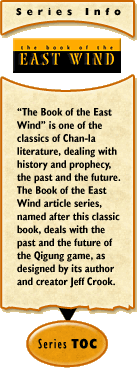 A Chill Wind Blows
A Chill Wind Blows
by Jeff Crook
December 5, 2000
Quoted from #11: A Brief History of Game, Part Four: Skotos, by Shannon Appelcline...
"Third lesson for StoryBuilders this week: Think small. Build from a constrained base rather than trying to create the whole world at once."
Even before Shannon’s last installment of Trials, Triumphs and Trivialities, I had been struggling with this problem. It came to a head Monday night (I believe) while I was asleep and having an awful dream in which I couldn’t distinguish between my own memories and the memory on my computer. I was wrestling with the notion of some pretty major changes to my original concept of Qigung, and in my dream I was afraid to make the changes in the computer because I thought that would cause me to forget everything I was erasing. It was as though the delete key would erase the stuff in my brain. It was a nightmare at the time, but upon reflection, it’s a shame we can’t really do this with some of our more moronic moments. Also, I’d like to make a back up, in case I crash.
In my original vision for this game, I envisioned a society made up of three races of humans. The Xao were the most ancient race, but their darkly glorious civilization was replaced by the barbarian Chan. Over the course of 2,000 years, the Chan built an empire even more glorious than the Xao. Then along came the Fong, 200 years ago, to defeat the Chan and make the Chan empire their own. All three races would exist in a state somewhere between harmony and cold warfare. And hanging over the entire bunch was a Sword of Damocles in the form of the black sun Zhi, who returns every 2,222 years, bringing cataclysm and destruction.
This seemed like a perfect starting point for a campaign, except for one drawback – when you design a game with such large-scale implications, you need a setting with a large scale in which to play it. I wouldn’t be able to get this game up and running without first designing the entire world, or at least a large part of it. I could have started with a single city, but not without eventually imposing illogical restraints on the players’ ability to leave that city. I touched on this in some of my first posts to the forums. Even then, back in August before I knew if my game would be chosen, I was confronting, as Shannon termed it in an internal email last week, the ‘critical element of constraint.’
But I didn’t want to throw away this plot that I had been developing for the past 18 months. I first started working on Qigung as a tabletop game at about the same time Christopher and Shannon were sitting in that hotel room looking at the Pacific Ocean and dreaming of what would soon be called Skotos.
During my dream of Monday night, the solution came to me, but its implementation was the source of my nightsweats. It involved a fundamental alteration to this plot, but allowed me to keep many of the elements that make this game so special for me. And so, without further ado, I shall pull back the curtain and show you the land of Chan-la, and introduce you to the first stage.
Qigung: The Ring of Fire
Three days ago, on midsummer’s eve, the black sun Zhi appeared in the skies over Chan-la, blotting out the day. As he appeared, the eight moons, representing the Eight Emperors of Heaven – the immortal gods – marshaled for battle against their dark celestial brother, while the stars themselves trembled and the earth below convulsed in a torment of earthquakes. The rivers swam out of their beds and tore through villages and fields; walls crashed into dust, whole cities sank in ruin, sending up plumes of smoke and fire. Mountains were riven asunder, freeing dragons and titanic beasts from their prisons beneath the earth. The gates of hell itself yawned wide and vomited up demons the likes of which had not been seen since the beginning of the world. Armies of devils, long awaiting this day, appeared from the forests, hills, and steppes and marched on the remains of human civilization.
From the ashes of destruction rose the last armies of humankind, drawn from the survivors of the cataclysm. They rode out from their cities and villages into a darkness that few believed would ever end, to fight the final battles in the last War of the Children of the Tao, even as the gods waged war in heaven. In forests, fields, hills and meadows, in streets and alleys and along mountain paths they fought and struggled and died. Husbands fell beside their wives, and their children stood over their bodies and battled to keep the fiends at bay. But to no avail.
Now, on the third day, a great silence has come over the land. The last survivors of the lands around the imperial city of Kangdao crawl out from their hiding places. They look upon a devastated land and a chill, dark ruin where the mightiest city in the empire once stood, now lit eerily by fires, and glistening with a strange frost. Though it is still summer, a chill bites the smoky air. They wonder where they will find shelter and food, and whether anyone they once knew has survived. Fong, Chan and Xao, slave, peasant and noble slowly make their way across the ravaged landscape toward Kangdao. The city seems the most likely place to find the answers to these questions, but no one knows the answer to the most burning question of all. Will the sun ever rise again?



